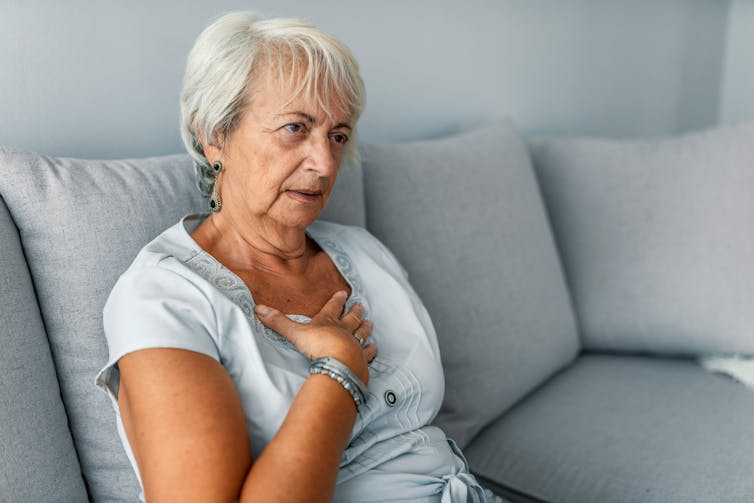
When you think of lung cancer treatment, what comes to mind – chemotherapy, radiation, surgery? While these can be crucial, there’s another powerful tool that’s often overlooked: exercise.
Our recent study, published in the Journal of Science and Medicine in Sport, challenges the common belief that people with lung cancer are too sick to be physically active.
In fact, we found exercise can play a vital role in improving life for those battling this disease.
What we did and what we found
Our review involved analysing 26 high quality studies on how best to incorporate exercise into treatment for lung cancer.
We found the overwhelming weight of evidence shows exercise offers benefits at every stage of the lung cancer journey. This includes:
- before surgery (being more fit can lead to faster recovery and potentially fewer complications)
- after surgery (gentle exercise helps regain strength and makes daily tasks easier)
- during other treatments (physical activity can ease side effects like fatigue and muscle weakness)
- at advanced stages of disease (even for late-stage patients, evidence shows exercise can improve quality of life and maintain independence)
- patients experiencing muscle wasting (evidence shows exercise, especially strength training, helps preserve muscle and keeps patients stronger).
What does exercise look like?
When we say “exercise,” we’re not talking about running marathons. For someone with lung cancer, it might mean:
- taking a short walk around the block
- doing some gentle cycling on a stationary bike
- swimming or doing some movement in the water
- lifting light weights or doing banded exercises
- doing yoga or tai chi for more mobile, flexible joints, as well as stress and pain reduction.
The key is to start slowly and listen to your body. What works for one person might not work for another.
Getting started safely
If you or a loved one has lung cancer and wants to be more active, start by talking with your doctor. They can advise on any precautions you should take and send you to an exercise specialist if needed.
You might also consider working with an exercise physiologist or physiotherapist who can design a safe, personalised program.
It’s OK to start small – even five to ten minutes of activity is beneficial, according to the Cancer Council Australia .
Try to be consistent, if you can. Regular, gentle exercise is better than occasional intense bursts.
It can help to keep track of your progress and how you feel after each session. You might also try looking for support groups or exercise classes specifically for cancer patients at local hospitals or community centres.
The Cancer Council Australia website offers inspiration and ideas on exercises to start with, even in the home.
The real-world benefits
Research shows regular physical activity can significantly improve quality of life for lung cancer patients. These can include:
- reduced fatigue, even though that might seem counterintuitive
- less breathlessness, as exercise can improve lung function
- less muscle weakness, which makes daily tasks easier
- better mood, as physical exercise can help fight depression and anxiety
- better sleep; many patients report sleeping more easily after starting an exercise routine.

Ditch the stigma, and get the exercise support you deserve
Lung cancer is the second most common cancer diagnosed worldwide. It’s a devastating illness that affects not just the body, but also a person’s mental health and quality of life.
Unfortunately, there’s often a stigma attached to lung cancer. Many patients feel judged, or that they must have done something – such as smoking – to “deserve” their diagnosis.
This shame can prevent people from seeking help or joining support programs.
But here’s an important truth: anyone can get lung cancer, even if they’ve never smoked.
And regardless of how someone developed the disease, they deserve compassion and the best possible care – including support for physical activity.
Never too late to start
It’s important to note exercise can be beneficial even for those receiving palliative care.
In palliative care, the goals shift from fighting the cancer to enhancing comfort and quality of life, and physical activity can play a significant role in this.

A lung cancer diagnosis is undoubtedly daunting. But we’re learning patients have more tools to improve their wellbeing than we once thought.
Exercise isn’t a cure, but it can be a powerful complement to traditional treatments and medications.
If you or someone you know is facing lung cancer, don’t be afraid to discuss incorporating exercise into the treatment plan with your health-care team. Start small, be patient and consistent, and remember that every bit of movement counts.
By challenging old assumptions and embracing exercise as part of lung cancer care, we can empower patients to take a more active role in their treatment.
The authors do not work for, consult, own shares in or receive funding from any company or organisation that would benefit from this article, and have disclosed no relevant affiliations beyond their academic appointment.
This article was originally published on The Conversation. Read the original article.







